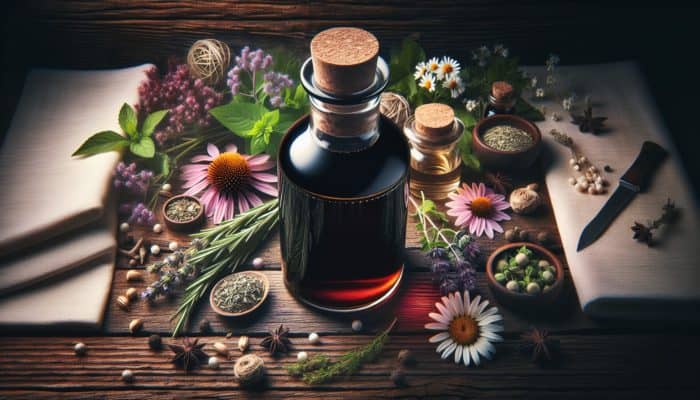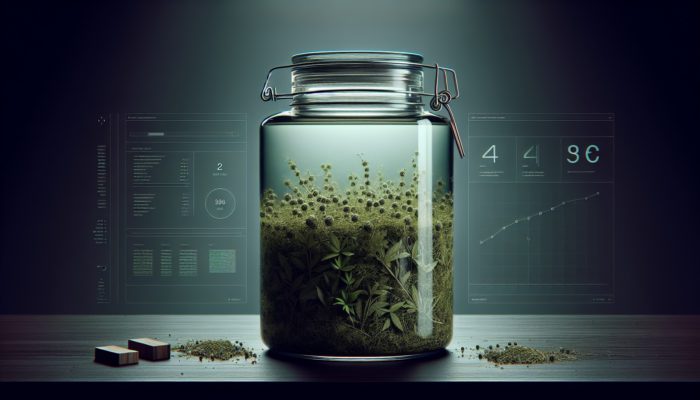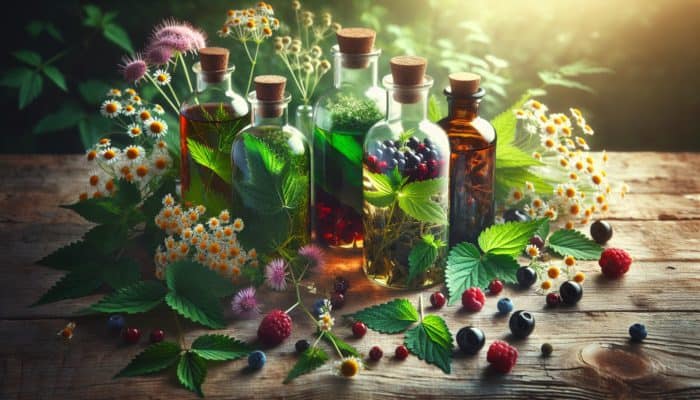Discover the Transformative Healing Advantages of Herbal Tinctures
Delving into the Core Principles of Herbal Tinctures

Engaging in DIY Herbal Tincture Recipes opens the door to a world of concentrated herbal tinctures, which are esteemed for their remarkable medicinal advantages. The intricate process of crafting these tinctures involves immersing selected herbs in a solvent, which is typically alcohol or vinegar. This technique facilitates the extraction of the herbs' active compounds, ensuring that their essential qualities are preserved, resulting in a robust product that can be easily consumed or incorporated into various natural remedies. In the UK, a diverse array of herbs commonly utilised in tincture formulations includes:
- nettle
- Elderberry
- Chamomile
- Thyme
- Lavender
- Milk Thistle
- Rosemary
- Peppermint
Unleashing the Multifaceted Benefits of Herbal Tinctures
The utilisation of tinctures brings forth a multitude of benefits for those in search of natural remedies. A primary advantage is their rapid absorption into the bloodstream, attributed to the alcohol or vinegar base, which facilitates quicker intake compared to other herbal forms. Furthermore, tinctures are celebrated for their extended shelf life, often remaining potent for several years when stored correctly. Their concentrated nature means that only a minimal quantity is required for effective dosing, rendering them both cost-effective and convenient to use. Additionally, tinctures can be effortlessly mixed with an array of liquids, enhancing consumption flexibility. Key benefits include:
- Rapid and effective absorption
- Extended shelf life when stored appropriately
- Versatility in dosing and consumption methods
- Cost-effectiveness due to concentrated formulations
Vital Safety Guidelines for the Use of Tinctures
Although tinctures are generally regarded as safe for most individuals, certain precautions should be observed prior to their use. It is crucial to recognise potential interactions with pharmaceutical medications, particularly for those on long-term treatment regimens. Responsible usage necessitates a thorough understanding of the unique properties of each herb and any contraindications that may arise. Consulting a healthcare professional before embarking on any new herbal regimen is particularly advisable for pregnant or nursing individuals, or those with pre-existing health conditions. Important safety guidelines include:
- Consult a healthcare provider prior to use.
- Stay informed regarding potential interactions with medications
- Initiate with small doses to assess individual tolerance
- Store tinctures in a cool, dark environment to prevent degradation
A Comprehensive Guide to Crafting Herbal Tinctures at Home

Creating your own herbal tinctures at home is a straightforward yet empowering endeavour, enabling the formulation of personalised remedies tailored to your health needs. Begin by selecting premium, organic herbs and an appropriate solvent, such as high-proof alcohol or vinegar. The conventional approach entails finely chopping the herbs and placing them in a sterilised jar, completely covering them with your chosen solvent. Secure the jar tightly and store it in a cool, dark place for a duration of several weeks, gently shaking it every few days to promote extraction. Once the steeping period concludes, strain the mixture through a fine mesh or cheesecloth to obtain the liquid tincture. This uncomplicated method allows you to fully harness the benefits of herbs while customising tinctures to align with your health conditions and personal preferences.
Proven Techniques for Crafting Your Own Herbal Tincture Recipes
Professional Insights into Formulating Effective Tinctures
Experts in the field of herbal medicine suggest several best practices for creating powerful tinctures that maximise potency and effectiveness. A pivotal recommendation is to utilise high-proof alcohol, as it extracts a wider variety of plant compounds compared to lower concentrations. Fresh, organic herbs are ideal due to their enhanced medicinal properties; however, dried herbs can also be employed with adjusted dosages. The recommended herb-to-alcohol ratio is typically 1:5 for dried herbs and 1:2 for fresh herbs, ensuring that the mixture retains its full potency.
Implement the following actionable steps to create your tincture:
1. Select and prepare your herbs: Clean and chop fresh herbs or measure dried herbs according to the desired ratio.
2. Combine herbs and solvent: Place the herbs in a clean glass jar and cover them with alcohol, ensuring complete submersion.
3. Seal and store: Secure the jar tightly and store it in a dark, cool place for 4 to 6 weeks, gently shaking every few days.
4. Strain and bottle: After the steeping period, strain the liquid using cheesecloth or a fine mesh strainer, transferring it to a dark glass bottle for storage.
Recognising the Most Effective Herbs for Tinctures

In the UK, a diverse range of herbs is recognised for their efficacy in tincturing, attributed to their therapeutic properties and cultural significance. Nettle is well-known for its anti-inflammatory benefits and is frequently employed to alleviate allergies and joint pain. Elderberry is highly regarded for its immune-boosting capabilities, particularly during the colder months when colds and flu are prevalent. Chamomile, a staple of UK herbalism, is esteemed for its calming properties, making it an exceptional choice for promoting relaxation and restful sleep.
One effective nettle tincture recipe involves using fresh leaves, soaking them in high-proof alcohol for six weeks, and then straining to create a potent extract. Elderberry tinctures can be prepared by combining fresh elderberries with vodka or brandy, producing a remedy that supports immune health. Chamomile tinctures can be crafted using dried flowers steeped in alcohol, yielding a soothing liquid that enhances sleep quality when consumed before bedtime.
Best Practices for Storing and Preserving Tinctures
Proper storage and preservation techniques are essential for maintaining the potency and quality of your tinctures. Tinctures should be housed in dark glass bottles to protect them from light exposure, which can degrade the herbal compounds over time. A cool, dark location, such as a cupboard or pantry, is ideal for tincture storage, as heat can also compromise their efficacy.
Label each tincture with the preparation date and its contents to ensure safe usage. It is advisable to regularly inspect your tinctures to confirm they remain sealed and free from contamination. By adhering to these expert storage recommendations, you can significantly prolong the shelf life of your tinctures, allowing you to reap their benefits for years to come.
Essential Herbs for Tinctures in the UK
Exploring the Health Benefits of Nettle Tincture
Nettle, commonly found in gardens and wild areas throughout the UK, is revered for its anti-inflammatory properties. Traditionally, this herb has been employed to alleviate symptoms associated with allergies, particularly hay fever, and to relieve joint pain, making it a popular choice for individuals seeking natural solutions. The high concentrations of vitamins and minerals found in nettle contribute to its health benefits, including support for kidney function and an overall boost to vitality.
In UK herbalism, nettle is frequently prepared as a tincture due to its concentrated nature, enabling effective dosing without the need for large quantities. When consumed as a tincture, nettle may assist in supporting seasonal allergy relief, potentially reducing reliance on pharmaceutical antihistamines. Furthermore, many herbalists recommend integrating nettle tincture into a daily regimen to enhance overall health, particularly in spring when pollen levels surge.
Understanding the Common Uses of Elderberry Tincture
Elderberry is a highly regarded herb in the UK, particularly noted for its immune-boosting properties. Traditionally, elderberry tincture is utilised during the cold and flu seasons to bolster the body's natural defences against viral infections. The berries are rich in antioxidants and have been shown to reduce the duration of colds and flu when taken at the onset of symptoms.
In practical applications, elderberry tincture can be mixed into warm water for a soothing drink or added to herbal teas to enhance immune support. Some individuals opt to take it daily throughout the winter months as a preventative measure, while others use it acutely when symptoms manifest. The versatility and effectiveness of elderberry tincture render it a staple in many herbal practices across the UK.
Utilising Chamomile Tincture for Relaxation and Calm
Chamomile is well-known for its tranquilising effects and is often used in tincture form to promote restful sleep and alleviate anxiety. This beloved herb boasts a rich legacy in UK herbalism, where it is valued for its gentle sedative properties. To maximise its relaxing effects, chamomile tincture can be taken before bedtime or during stressful moments throughout the day.
This tincture can be seamlessly integrated into a calming evening routine, perhaps mixed into a warm cup of milk or herbal tea to enhance relaxation. Additionally, chamomile tincture can be applied topically to soothe skin irritations or relieve tension headaches. Its versatile applications make chamomile a favourite among herbal enthusiasts seeking natural remedies for daily stress and sleep disturbances.
Practical Guidelines for Crafting Tinctures at Home
Key Considerations When Choosing Herbs for Tinctures
Selecting the right herbs for your tinctures is the foundational step in creating effective remedies. The choice of herbs should align with the health benefits you wish to achieve; for instance, choose chamomile for relaxation or nettle for allergy relief. Freshness and quality are paramount—always opt for organic herbs when possible, as they are less likely to be tainted with pesticides or other harmful substances.
For beginners in tincture-making, herbs like peppermint, chamomile, and lavender are excellent choices due to their availability and ease of preparation. These herbs yield effective tinctures and serve multiple purposes, from aiding digestion to promoting restful sleep. By thoughtfully curating your herb selection, you can create tinctures specifically tailored to your health needs and personal preferences.
Proper Techniques for Preparing Herbs for Tinctures
Effective preparation of herbs is crucial for maximising the extraction of their beneficial compounds during the tincture-making process. Start by thoroughly cleaning the herbs to eliminate any dirt or contaminants. For fresh herbs, gently rinse them under cool water and pat them dry with a clean towel.
Chopping the herbs into smaller pieces increases their surface area, enhancing the extraction of active ingredients. In certain cases, particularly with dried herbs, lightly crushing them can further amplify the potency of the tincture. It's also important to note that some herbs may require drying before tincturing, as moisture can dilute the alcohol and impede extraction efficiency. By focusing on the preparation stage, you ensure that your tinctures are as effective as possible.
Comprehending the Stages of the Tincturing Process
The tincturing process is a combination of art and science, requiring precision and patience. Once your herbs are prepared, place them in a clean, sterilised jar and thoroughly cover them with your chosen solvent, typically high-proof alcohol. Secure the lid tightly and store the jar in a dark, cool location, allowing the mixture to steep for several weeks.
During the steeping phase, it is essential to gently shake the jar every few days to facilitate the extraction process. The ideal steeping duration may vary depending on the herb used; generally, fresh herbs benefit from soaking for 4 to 6 weeks, while dried herbs may steep for 6 to 8 weeks. After the suggested steeping period, strain the mixture to separate the liquid tincture from the plant material, ensuring that you capture all potent extracts. This meticulous approach culminates in a powerful herbal remedy ready for use.
Evidence-Based Insights into the Benefits of DIY Herbal Tincture Recipes
Scientific Research Supporting the Effectiveness of Tinctures
Research indicates that tinctures serve as an effective means of delivering herbal compounds, supporting various health benefits. Studies often focus on specific herbs and their unique actions within the body. For instance, elderberry has been documented to possess antiviral properties, and its effectiveness in reducing the duration of influenza symptoms aligns well with its traditional uses in herbal medicine.
Additionally, an expanding body of evidence supports the idea that tinctures, due to their concentrated nature, can provide higher doses of beneficial compounds compared to other herbal forms, such as teas or capsules. This makes tinctures a particularly potent option for those looking to harness the full potential of herbal remedies in a convenient format. As the interest in natural and holistic health continues to rise, scientific exploration into tinctures is likely to increase, further cementing their role in modern herbal practices.
Comparative Advantages of Tinctures Over Other Herbal Preparations
Tinctures offer distinct advantages over traditional herbal forms like teas and capsules, primarily regarding absorption and convenience. Unlike teas, which require hot water to extract active compounds and can be time-consuming to prepare, tinctures are ready for immediate consumption and provide a concentrated dose with just a few drops. Capsules, while convenient, may not always guarantee complete absorption of herbal constituents, as stomach acidity can affect their effectiveness.
For individuals weighing their options between herbal preparations, tinctures can be especially advantageous for those who struggle with digestion or seek prompt effects from their herbal remedies. Ultimately, the choice depends on personal preference, lifestyle, and specific health needs. Maintaining a comprehensive understanding of the advantages and potential drawbacks of each form can assist in making informed decisions regarding herbal remedies.
Awareness of Potential Side Effects and Precautions
While tinctures are generally safe for many individuals, it is vital to remain aware of potential side effects or interactions with medications. Certain herbs may provoke allergic reactions, especially in those sensitive to specific plant families. Furthermore, certain tinctures may interact with pharmaceuticals, potentially affecting their efficacy or leading to adverse effects.
To effectively manage potential side effects, it is advisable to initiate with small doses and closely monitor any reactions that may occur. Keeping a journal of your tincture experiences can help identify patterns related to side effects and allow for dosage adjustments as needed. By remaining informed and proactive, you can enjoy the benefits of tinctures while minimising any associated risks.
Ensuring the Quality of Your DIY Tinctures
Maintaining the quality of your DIY tinctures is essential for both safety and efficacy. Start by selecting high-quality, organic herbs known for their potency. Accurate measurements of both herbs and solvents are vital for crafting an effective tincture, as incorrect ratios can result in weak or overly concentrated products.
Proper storage is another key factor; tinctures should be kept in dark glass bottles to protect them from light and ideally stored in a cool, dark environment. Regularly checking your tinctures for signs of spoilage or degradation ensures that you only utilise effective remedies. By adhering to these quality assurance practices, you can feel confident in the tinctures you create at home.
Where to Find High-Quality Herbs in the UK
The Benefits of Shopping at Local Health Food Stores
Local health food stores in the UK often boast a diverse selection of herbs suitable for tincturing, many sourced from local suppliers. These establishments typically offer high-quality, organic herbs, making them a trustworthy option for those interested in creating their tinctures. When shopping at health food stores, it’s prudent to inquire about the origins of the herbs to ensure their quality and sustainability.
Moreover, local health food stores frequently feature knowledgeable staff who can provide valuable insights into the best herbs for specific ailments, further supporting you in your tincture-making ventures. Supporting local businesses not only benefits your health but also contributes to the community and promotes sustainable practices within the herbal industry.
The Advantages of Sourcing Herbs from Online Suppliers
The convenience of online shopping has revolutionised the process of sourcing herbs for tinctures in the UK. Numerous reputable online suppliers offer an extensive range of herbs, complete with detailed information regarding their origins, quality, and intended uses. Websites specialising in herbal products often include customer reviews, enabling you to make informed choices when selecting herbs.
When choosing an online supplier, prioritise those that emphasise organic and sustainably sourced herbs. Furthermore, verifying certifications or third-party testing can provide additional reassurance regarding the quality of the products you purchase. Trusted online suppliers not only save you time but can also grant access to unique herbs that may not be available locally.
The Rewards of Foraging for Herbs in the UK Countryside
Foraging for wild herbs in the UK countryside can be a fulfilling experience, allowing you to connect with nature while sourcing fresh herbs for tinctures and other herbal remedies. Common foraging targets include nettle, elderberry, and dandelion. However, it is crucial to educate yourself on foraging laws and sustainable practices to ensure that your activities are both legal and ecologically responsible.
Before embarking on a foraging adventure, familiarise yourself with the specific plant species and their habitats, as well as any potential look-alikes that may be toxic. Foragers should respect local guidelines regarding land access and conservation efforts. Engaging in responsible foraging not only provides fresh herbs but also fosters biodiversity and encourages a deeper appreciation for the natural environment.
Practical Tips for Using and Dosing Herbal Tinctures
Mastering the Art of Tincture Dosing for Optimal Results
Effectively dosing tinctures involves consideration of various factors, including the specific herb used, the tincture's strength, and individual health requirements. Generally, it is advisable to start with a small dose, such as 1 to 2 dropperfuls, and observe how your body responds before gradually increasing the amount.
Indicators of proper dosing may include relief from targeted symptoms without the emergence of adverse effects. Keeping a record of your dosing experiences can enhance your understanding of how your body reacts and refine your approach over time. Personalising your dosage based on your body's responses is a crucial step in utilising tinctures effectively.
Creative Methods for Incorporating Tinctures into Your Daily Life
Integrating tinctures into your daily routine can be both enjoyable and straightforward. Tinctures can be added to a variety of liquids, such as water, juice, or herbal tea, providing flexibility in consumption. This versatility allows you to seamlessly incorporate tinctures into your lifestyle, whether as a morning tonic or an evening relaxation aid.
Additionally, tinctures can be creatively utilised in cooking and baking, enhancing dishes with their herbal benefits. For example, a few drops of chamomile tincture can be added to dessert recipes for a calming effect, while elderberry tincture can be mixed into homemade syrups or sauces for an immune-boosting addition. By exploring innovative ways to incorporate tinctures into your meals, you can enjoy their benefits while elevating your culinary experience.
Monitoring and Adjusting Your Tincture Usage for Best Results
Tracking your tincture use and its effects is an invaluable practice that allows for the optimisation of your herbal regimen. Maintaining a journal can help you log dosages, frequency, and any notable changes in symptoms or overall well-being. This information can be crucial in identifying patterns and making informed adjustments to your tincture use.
When using tinctures regularly, remain open to modifying your approach based on how you feel. This may involve adjusting the dosage, switching herbs, or changing the time of day you take your tinctures. By actively monitoring your experiences, you can tailor your herbal use to align with your evolving health needs and ensure you’re maximising the benefits of your tinctures.
Frequently Asked Questions Regarding Herbal Tinctures
Which Type of Alcohol Is Most Suitable for Crafting Tinctures?
High-proof alcohol, such as vodka or brandy with an alcohol content of at least 40%, is optimal for tinctures as it effectively extracts the active compounds from herbs.
What Is the Shelf Life of Homemade Tinctures?
When stored correctly in dark glass bottles in a cool, dark environment, homemade tinctures can last for several years, maintaining their potency throughout.
Is It Safe to Consume Large Quantities of Tinctures?
It is advisable to start with small doses and gradually increase as needed. Taking large amounts may lead to adverse effects, depending on the specific herb.
Are Tinctures Safe for Children to Consume?
Tinctures may not be suitable for children due to their alcohol content. Always consult a healthcare provider before administering tinctures to children.
How Can I Determine the Effectiveness of a Tincture?
You can assess a tincture's effectiveness by observing any changes in symptoms or overall health following its use, provided that proper dosing is adhered to.
Is It Possible to Combine Different Tinctures?
Yes, you can mix different tinctures, but it’s essential to understand the properties of each herb to ensure they complement each other and avoid adverse effects.
Do Tinctures Require Refrigeration?
Tinctures do not require refrigeration; storing them in a cool, dark place is sufficient for preserving their quality over time.
What Is the Most Effective Method for Administering Tinctures?
Tinctures can be taken directly or added to water, juice, or tea for a refreshing experience. Consuming them on an empty stomach can enhance absorption.
Can I Use Dried Herbs Instead of Fresh Ones for Tinctures?
Yes, dried herbs can be used for tinctures, but the herb-to-alcohol ratio typically differs, often requiring more dried herbs than fresh.
What Should I Do If I Experience Side Effects from a Tincture?
If you experience side effects from a tincture, discontinue use immediately and consult a healthcare provider for guidance on managing reactions.
Connect with us on Facebook!
The Article: DIY Herbal Tincture Recipes: UK’s Natural Remedies appeared first on https://mcrtherapies.co.uk
The Article Herbal Tincture Recipes: Discover the UK’s Natural Remedies Was Found On https://limitsofstrategy.com

